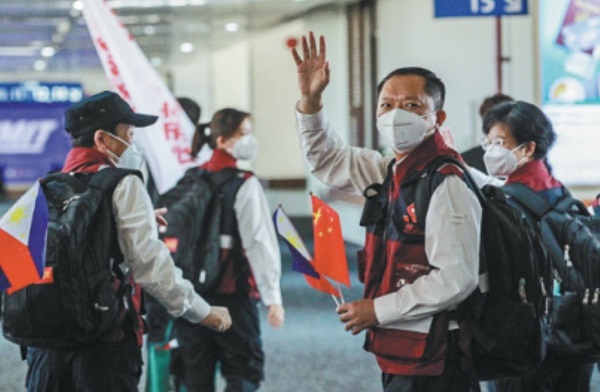Nation hailed for efforts in pandemic fight

Chinese medical workers leave Manila, capital of the Philippines, last month after a two-week stay to help the country fight the virus. [Photo/Xinhua]
China has played responsible global role during health crisis, UK observers say
China has acted as a responsible global player, both to its own people and those elsewhere in the world, in the fight against the novel coronavirus pandemic, according to observers from the United Kingdom.
It has done so by being one of the first nations to emerge from lockdown and restore economic and social activities, they said.
Christopher Bovis, a professor of international business law at the University of Hull, said China has shown strong global leadership to the world in efforts to combat the pandemic and has led the way by introducing a range of public policy measures.
"China's best practice of social distancing and movement control has paid dividends in controlling infected areas. A pioneering system of screening and monitoring the population has played a significant role in the dynamic planning of response measures by governments," he said.
COVID-19 has reached more than 210 countries and regions, infected about 5 million people and claimed over 300,000 lives.
International and cross-border collaboration is important to tackle the pandemic-something China strongly believes in, Bovis said.
"The country has shown demonstrable commitment and willingness in collaborating on COVID-19-related research, vaccine development and medical equipment provision-encouraging openness and data sharing in order to help ensure diagnostics, vaccines and prevention measures are developed rapidly for the benefit of every nation," he added.
The impact of the pandemic on China's global standing has featured in discussions during the two sessions, the country's most important annual political events, which got underway on Thursday.
The two sessions are usually held in March, but this year were postponed for two months due to the pandemic.
The term refers to the annual session of the National People's Congress, China's top legislature, and the National Committee of the Chinese People's Political Consultative Conference, the nation's top political advisory body.
Ahead of the two sessions, President Xi Jinping delivered a speech via video link to the 73rd World Health Assembly. He called on the international community to increase political and financial support for the World Health Organization to mobilize global resources to defeat the virus.
China pledged to provide $2 billion over two years to help with the COVID-19 response and with economic and social development in countries affected by the pandemic-especially developing nations, with any vaccine it develops being made available globally.
Jenny Clegg, vice-president of the Society for Anglo-Chinese Understanding, hailed Xi's commitments, saying China is setting an example in international cooperation.
She said the country deserves credit for "a remarkable job in containing the virus, with fewer than 5,000 deaths", as it has acted decisively.
"Yes, there were mistakes at first-let's not forget that China was the first to face this virus-but we now know how difficult it is to detect and to test," Clegg said.
"What the government did was follow rigorously standard public health procedure to test, trace and isolate. The lockdown really was a lockdown, no matter the short-term damage to the economy."
Xi also appealed for international macroeconomic policy coordination to be strengthened and for the protection of global industrial and supply chains.
Bovis said he believes China will play a pivotal role in global economic development after the pandemic is brought under control around the world. "Such a role emanates from China's leadership credentials and its aspirations for responsible and sustainable development," he added.
Observers said the effects of the pandemic will shift geopolitical priorities in terms of trade, governance, leadership and cultures. Certain countries and regions will emerge from it closer and possibly stronger in their future relations, with others facing the prospect of isolation and inward-looking systems.
Stephen Perry, chairman of The 48 Group Club, an independent business network committed to promoting trade and cultural links between the UK and China, said COVID-19 is likely to strengthen China's links with countries taking part in the Belt and Road Initiative.
China is moving to switch its trade and investment to nations that have signed up to the BRI and associates such as India, Japan and South Korea, Perry said.
"My estimate is that these BRI regions and nations already account for over 50 percent of China's trade and investment, with (that of) the West probably down from 60 percent in 2007 to about 28 percent now."
Peter Frankopan, a professor of global history at Oxford University, said combating the pandemic is a worldwide responsibility.
"In a deeply interconnected world, even one where there are loud voices criticising globalisation, it is important to remember how much we all depend on each other," he said.
"So, when China recovers, that is a good start and a good sign for others; but for all of us to move forward-including China-we need to solve COVID-19 properly, as global problems require global solutions."
- NHC minister visits Cuba
- NHC vice-minister meets with president of GE HealthCare
- NHC minister holds talks with WHO director-general via video link
- NHC minister meets with German health minister
- China to allow wholly foreign-owned hospitals in certain areas
- China's average life expectancy rises to 78.6 yrs


